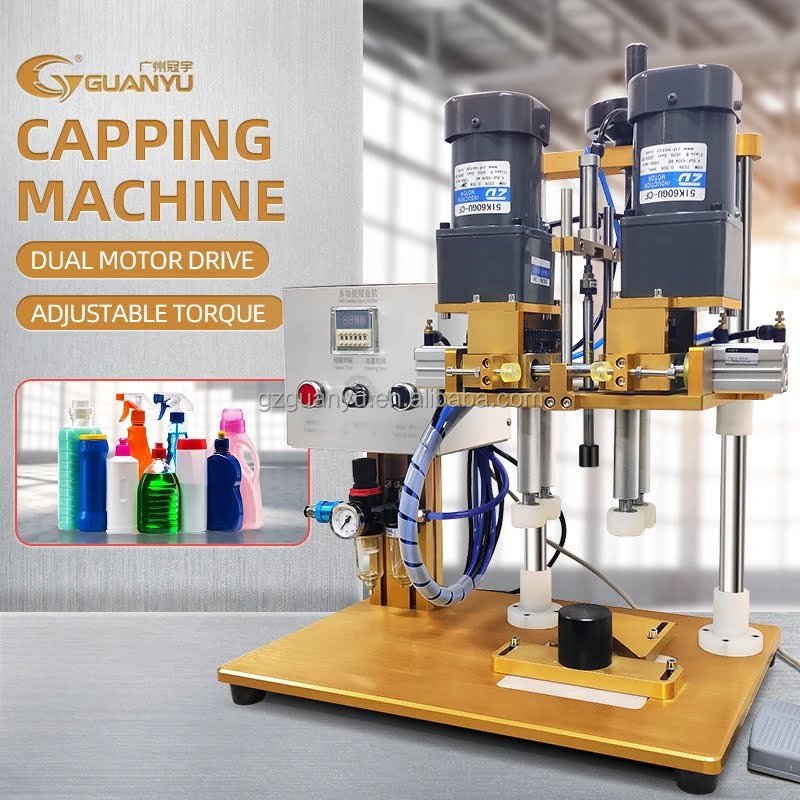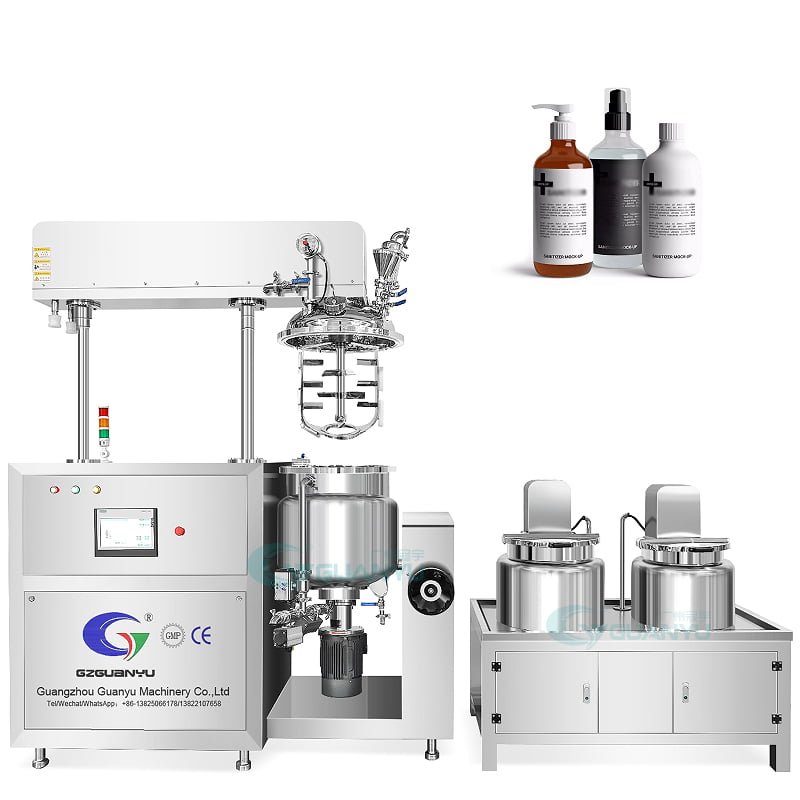Mono- und Diglyceride (Mdg), auch als Monoacylglycerine bekannt, sind eine Klasse von Glyceriden, die aus einem Glycerinmolekül bestehen, das an eine einzelne Fettsäurekette gebunden ist. Diese Verbindungen sind als Lebensmittelzusatzstoffe und Emulgatoren bekannt, finden umfangreiche Verwendung in verschiedenen Branchen, einschließlich der Lebensmittelindustrie, Kosmetika, Arzneimittel, und darüber hinaus. Dieser Artikel befasst sich mit den vielfältigen Anwendungen von Monoglyceriden und beleuchtet die Bedeutung industrieller Mischer, insbesondere ummantelte Mischgefäße, in ihrer Produktion.

1. Anwendungen in der Lebensmittelindustrie
Aufgrund ihrer Emulgierwirkung spielen Monoglyceride in der Lebensmittelindustrie eine entscheidende Rolle, stabilisierend, und konservierende Eigenschaften.
Bäckerei und Konditorei
In Backwaren wie Brot, Kuchen, und Gebäck, Monoglyceride verbessern die Plastizität und Stabilität des Teigs, Erhöhen Sie das Brotvolumen, und die Haltbarkeit verlängern. Sie tragen dazu bei, dass Backwaren weich und feucht bleiben, Gewährleistung eines frischen und ansprechenden Produkts für die Verbraucher. Im Süßwarenbereich, Monoglyceride verhindern die Kristallisation des Zuckers, Verbesserung der Textur und des Glanzes von Süßigkeiten und Schokolade.
Milchprodukte
Monoglyceride sind ein wesentlicher Bestandteil von Milchprodukten wie Eiscreme, Creme, und Käse. Sie verbessern die Textur, Mundgefühl verbessern, und verhindern die Trennung von Wasser und Fett. Im Eis, zum Beispiel, Monoglyceride tragen zu einer glatten und cremigen Konsistenz bei, verhindert die Bildung von Eiskristallen und sorgt für eine stabile Emulsion.
Getränke
In Getränken wie aromatisierter Milch, Kaffeegetränke, und Fruchtsäfte, Monoglyceride wirken als Emulgatoren und verhindern die Trennung der Inhaltsstoffe, Gewährleistung eines einheitlichen und ansprechenden Produkts. Sie verbessern die Stabilität und Konsistenz des Getränks, Aufrechterhaltung seiner Qualität während der Lagerung und des Verbrauchs.
Fertiggerichte
Monoglyceride werden in Instant-Lebensmitteln wie Instant-Nudeln und Tiefkühlkost verwendet, um die Textur und das Mundgefühl zu verbessern. Sie verbessern das gesamte Esserlebnis, indem sie für die gewünschte Textur und Konsistenz sorgen, Dadurch werden diese Produkte für die Verbraucher schmackhafter und angenehmer.

2. Kosmetik- und Körperpflegeprodukte
Monoglyceride sind in der Kosmetik- und Körperpflegeindustrie wertvoll, wo sie als Emulgatoren dienen, Stabilisatoren, und Feuchtigkeitscremes.
Lotionen und Cremes
In Lotionen und Cremes, Monoglyceride helfen dabei, Öl- und Wasserphasen zu vermischen, um stabile Emulsionen zu bilden. Das Ergebnis sind Produkte mit einer glatten Textur, die sich leicht auftragen und in die Haut einziehen lassen. Monoglyceride erhöhen die Stabilität und Wirksamkeit feuchtigkeitsspendender und pflegender Inhaltsstoffe, Bereitstellung einer angenehmen Benutzererfahrung.
Shampoos und Spülungen
In Haarpflegeprodukten wie Shampoos und Spülungen, Monoglyceride verbessern die Emulgierung und Schaumstabilität. Sie tragen zu einem reichhaltigen Schaum bei und verstärken die Weichheit und den Glanz des Haares. Monoglyceride tragen zur gleichmäßigen Verteilung der Pflegestoffe bei, sorgt dafür, dass das Haar glatt bleibt, überschaubar, und gesund aussehend.
Hautpflegeprodukte
Monoglyceride werden in verschiedenen Hautpflegeprodukten verwendet, einschließlich Feuchtigkeitscremes, Reinigungsmittel, und Seren, für ihre feuchtigkeitsspendenden und erweichenden Eigenschaften. Sie tragen zur Aufrechterhaltung der Hautfeuchtigkeit bei und bilden eine Schutzbarriere, Verhindert Feuchtigkeitsverlust und verbessert die Hautstruktur und Elastizität.
3. Pharmazeutika und Nutraceuticals
In der pharmazeutischen und nutrazeutischen Industrie, Monoglyceride werden als Hilfsstoffe und Emulgatoren verwendet.
Arzneimittelformulierungen
Monoglyceride dienen als Hilfsstoffe in Arzneimittelformulierungen, Unterstützung bei der Abgabe und Absorption pharmazeutischer Wirkstoffe (APIs). Sie erhöhen die Löslichkeit und Bioverfügbarkeit schwer wasserlöslicher Arzneimittel, Verbesserung ihrer therapeutischen Wirksamkeit. Monoglyceride tragen auch zur Stabilisierung von Arzneimittelformulierungen bei, Sicherstellung gleichbleibender Qualität und Leistung.
Nahrungsergänzungsmittel
Monoglyceride werden in Nahrungsergänzungsmitteln eingesetzt, um die Aufnahme fettlöslicher Vitamine und anderer Nährstoffe zu verbessern. Sie erhöhen die Bioverfügbarkeit dieser Verbindungen, Dadurch werden sie wirksamer bei der Förderung von Gesundheit und Wohlbefinden. Monoglyceride sind häufig in Vitaminformulierungen enthalten, Mineralien, und Nahrungsergänzungsmittel zur Verbesserung ihrer Stabilität und Wirksamkeit.
4. Industrielle Anwendungen
Über Essen und Körperpflege hinaus, Monoglyceride finden in verschiedenen industriellen Prozessen Anwendung.
Kunststoffe und Gummi
In der Kunststoff- und Gummiindustrie, Monoglyceride dienen als Weichmacher und Stabilisatoren. Sie verbessern die Verarbeitungseigenschaften von Polymeren, Verbesserung der Flexibilität, Haltbarkeit, und Gesamtqualität der Endprodukte. Monoglyceride tragen dazu bei, den Abbau während der Verarbeitung zu verhindern, Sicherstellung der Produktion hochwertiger Kunststoff- und Gummimaterialien.
Textilien
In der Textilherstellung, Monoglyceride wirken als Gleitmittel und Weichmacher, Verbesserung der Weichheit und des Griffgefühls der Fasern. Sie erleichtern die Handhabung und Verarbeitung von Textilien, Das Ergebnis sind Stoffe mit hervorragender Textur und Komfort. Monoglyceride tragen auch zur Haltbarkeit und Optik von Textilprodukten bei.
5. Tierfutter
In der Tierernährung, Monoglyceride werden dem Futter zugesetzt, um dessen Nährwert und Schmackhaftigkeit zu verbessern.
Futtermittelzusatzstoffe
Monoglyceride verbessern die Verdaulichkeit und Aufnahme von Nährstoffen im Tierfutter, Förderung eines besseren Wachstums und einer besseren Gesundheit des Viehbestands. Sie verbessern die Stabilität und Haltbarkeit von Futterformulierungen, Sicherstellen, dass die Tiere eine gleichbleibende und qualitativ hochwertige Ernährung erhalten. Monoglyceride sind besonders hilfreich bei der Verbesserung der Aufnahme fettlöslicher Vitamine und essentieller Fettsäuren.
Die Rolle von Ummantelte Mischgefäße in Mono- und Diglyceride (Mdg) Produktion
Die Produktion von Monoglyceriden erfordert eine genaue Kontrolle verschiedener Parameter, inklusive Temperatur, Mischgeschwindigkeit, und Reaktionszeit. Hier kommen Industriemischer zum Einsatz, insbesondere ummantelte Mischgefäße, eine zentrale Rolle spielen.

Vorteile von ummantelten Mischbehältern
Doppelwandige Mischbehälter sind doppelwandig ausgeführt, Ermöglicht eine präzise Temperaturkontrolle durch die Zirkulation von Heiz- oder Kühlflüssigkeiten im Mantel. Dadurch wird sichergestellt, dass die Reaktionsbedingungen auf optimalem Niveau gehalten werden, entscheidend für die effiziente Produktion hochwertiger Monoglyceride. Zu den Vorteilen der Verwendung ummantelter Mischgefäße bei der Monoglyceridproduktion gehören::
- Temperaturregelung: Für den Veresterungsprozess, bei dem Monoglyceride entstehen, ist eine präzise Temperaturregelung unerlässlich. Ummantelte Behälter ermöglichen ein präzises Heizen und Kühlen, Gewährleistung konsistenter und kontrollierter Reaktionsbedingungen.
- Effizientes Mischen: Das richtige Mischen ist entscheidend für eine gleichmäßige Reaktion und eine hohe Ausbeute. Ummantelte Mischbehälter sind für effizientes und gründliches Mischen konzipiert, verhindert die Entstehung von Hotspots und sorgt für ein homogenes Produkt.
- Skalierbarkeit: Ummantelte Mischgefäße gibt es in verschiedenen Größen, Dadurch eignen sie sich sowohl für die Produktion im kleinen Labor als auch für die industrielle Fertigung im großen Maßstab. Diese Skalierbarkeit ermöglicht es Herstellern, unterschiedliche Produktionsanforderungen zu erfüllen.
- Vielseitigkeit: Ummantelte Behälter können für eine Vielzahl chemischer Reaktionen und Prozesse eingesetzt werden, Dies macht sie zu einem vielseitigen Werkzeug bei der Herstellung von Monoglyceriden und anderen chemischen Verbindungen.
Verfahren zur Herstellung von Monoglyceriden unter Verwendung Ummantelte Mischgefäße
- Rohstoffvorbereitung: Der Prozess beginnt mit der Vorbereitung der Rohstoffe, typischerweise Glycerin und Fettsäuren. Diese Komponenten werden abgemessen und in den ummantelten Mischbehälter gefüllt.
- Erhitzen und Mischen: Das ummantelte Gefäß wird auf die gewünschte Temperatur erhitzt, Einleiten der Veresterungsreaktion. Der Inhalt wird gründlich gemischt, um eine gleichmäßige Wärmeverteilung und eine effiziente Reaktionskinetik zu gewährleisten.
- Reaktionsüberwachung: Während des gesamten Prozesses, Die Reaktion wird genau überwacht, und Parameter wie Temperatur, Druck, und Mischgeschwindigkeit werden nach Bedarf angepasst, um optimale Bedingungen aufrechtzuerhalten.
- Kühlung und Erholung: Nachdem die Reaktion abgeschlossen ist, Die Mischung wird mithilfe des Kühlsystems des ummantelten Behälters gekühlt. Das Endprodukt, Monoglyceride, wird dann zurückgewonnen und zur weiteren Verwendung gereinigt.
- Qualitätskontrolle: Die hergestellten Monoglyceride werden strengen Qualitätskontrolltests unterzogen, um sicherzustellen, dass sie den Industriestandards und -spezifikationen entsprechen.

Abschluss
Monoglyceride sind vielseitige Verbindungen mit einem breiten Anwendungsspektrum in verschiedenen Branchen. Ihre Rolle als Emulgatoren, Stabilisatoren, und funktionelle Zusatzstoffe machen sie in Lebensmitteln von unschätzbarem Wert, Kosmetika, Arzneimittel, und industrielle Prozesse. Die Herstellung von Monoglyceriden ist in hohem Maße auf fortschrittliche Mischtechnologien angewiesen, Dabei spielen ummantelte Mischbehälter eine entscheidende Rolle für die Effizienz, skalierbar, und hochwertige Produktion.
Durch Nutzung der Fähigkeiten ummantelter Mischbehälter, Hersteller können den Produktionsprozess optimieren, Erzielung konsistenter Ergebnisse und Erfüllung der wachsenden Nachfrage nach Monoglyceriden in verschiedenen Anwendungen. Diese technologische Synergie unterstreicht die Bedeutung von Innovation und Präzision in der chemischen Fertigungsindustrie, Wir treiben die Entwicklung und Nutzung lebenswichtiger Verbindungen wie Monoglyceride voran.



I got this web site from my buddy who informed me about
this web site and at the moment this time I am visiting this web page and reading very informative articles or
reviews at this time.
my webpage nordvpn coupons inspiresensation
Hi, yup this article is really nice and I have learned lot of things from it regarding
blogging. thanks.
Visit my website; Nordvpn coupons Inspiresensation
Its like you read my thoughts! You seem to understand a lot approximately this, such as you wrote
the book in it or something. I feel that you just could do with a few %
to drive the message home a little bit, but other than that, this is fantastic blog.
A fantastic read. I will definitely be back.
Here is my webpage; eharmony special coupon code 2025
Post writing is also a excitement, if you be familiar with then you can write or else it is complex to write.
Feel free to surf to my website: vpn
Hey just wanted to give you a quick heads up.
The words in your article seem to be running off the screen in Ie.
I’m not sure if this is a formatting issue or something to do with internet browser compatibility but I thought I’d post
to let you know. The layout look great though!
Hope you get the issue solved soon. Thanks gamefly 3
month free trial https://tinyurl.com/28555853
Heya i am for the first time here. I found this board and I find It truly useful & it helped me out much.
I hope to give something back and aid others like you aided me.
What does vpn stand for https://tinyurl.com/2atd6fak
Hi every one, here every person is sharing these experience, therefore it’s fastidious
to read this blog, and I used to pay a quick visit this weblog all the time.
I think everything published made a ton of sense. However, think on this, what if you
added a little content? I am not suggesting your information isn’t good, however
what if you added something to maybe grab folk’s attention? I mean mono- and diglycerides (MDG),Mixing Vessels application is kinda boring.
You ought to peek at Yahoo’s front page and note how they write post headlines to
grab viewers interested. You might try adding a video or a related picture or two to get people interested about everything’ve got to say.
In my opinion, it would make your blog a little bit more interesting.
I always spent my half an hour to read this web site’s articles or reviews everyday along
with a cup of coffee. https://tinyurl.com/yvodnsan eharmony special coupon code 2025
Your style is very unique compared to other folks I’ve read stuff from.
I appreciate you for posting when you have the
opportunity, Guess I’ll just bookmark this blog.
my page; https://tinyurl.com/hwkdwerb
Vielen Dank für Ihr Teilen. Ich mache mir Sorgen, dass mir kreative Ideen fehlen. Es ist Ihr Artikel, der mich voller Hoffnung macht. Danke. Aber, Ich habe eine Frage, Kannst du mir helfen??
It’s remarkable for me to have a web site, which is valuable designed for my
experience. thanks admin vpn https://www.highlandguides.com